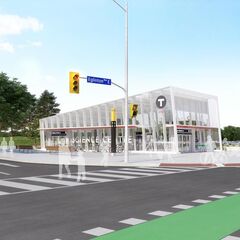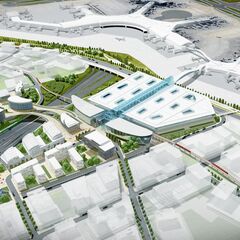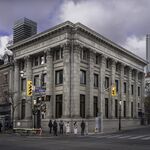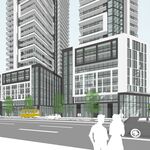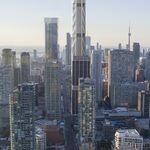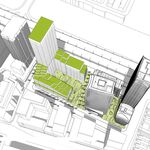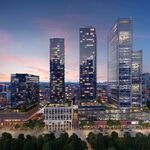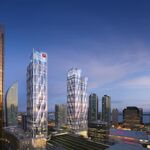As UrbanToronto reported yesterday, the Government of Ontario and the City of Toronto have finally reached an agreement on funding—and building—rapid transit projects in Toronto.
The Province still proposes four priority transit projects—assuming all construction costs, but without requiring the City to contribute any funds:
- building the Ontario Line "subway" between Exhibition GO Transit Station and the coming Science Centre Station on the Crosstown LRT line for a cost of $10.8 billion. (This project replaces the City plans for the Relief Line South subway). This line would likely operate with smaller cars than traditional Toronto subways, but with more frequent service;
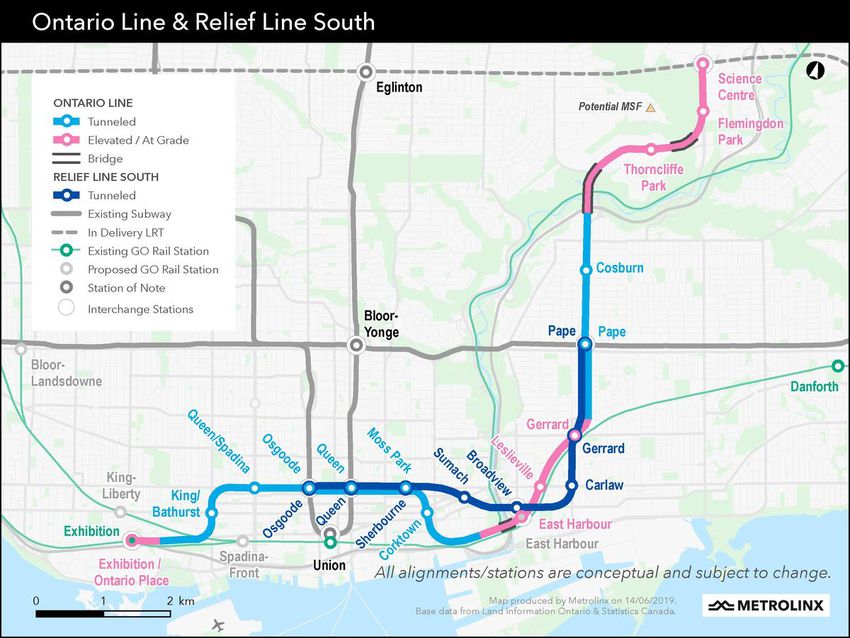 This map compares the original City plan for the relief line and the revised Ontario line, image, Metrolinx
This map compares the original City plan for the relief line and the revised Ontario line, image, Metrolinx
- extending the TTC's Line 2 Bloor-Danforth subway further into Scarborough with three new stations for $5.5 billion. (The City proposed just one stop);
- extending the Yonge branch of the Line 1 Yonge-University subway into York Region for $5.6 billion; and
- extending the Crosstown LRT further west along Eglinton to Renforth Station on the Mississauga Transitway (and, eventually, to a future transit hub at Toronto Pearson International Airport) for $4.7 billion.
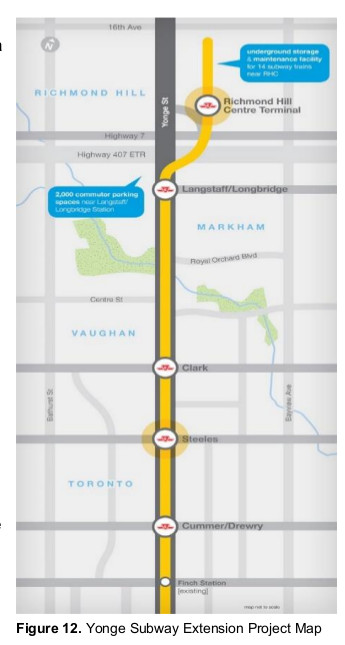 An earlier plan for extending Line 1, image, City of Toronto
An earlier plan for extending Line 1, image, City of Toronto
If City Council approves the plan, the City would be able to reallocate its share of the funding for these projects to upgrade its current transit infrastructure, or, conditionally, use the money to support other projects. The proposal also reallocates nearly $3.8 billion in federal infrastructure funding that Toronto has already received. A City staff report indicates $660 million of the funds would support the Line 2 project, while City will also distribute $3.16 billion worth of federal dollars to the Ontario Line.
Mayor John Tory explained, "After almost a year of discussions, I believe we have a way forward that will see close to $30 billion dollars of new transit built in Toronto, right across our city, and will keep the... subway system in the hands of the Toronto taxpayers who built it up and have the most to gain from making sure it continues to be supported in a proper way.
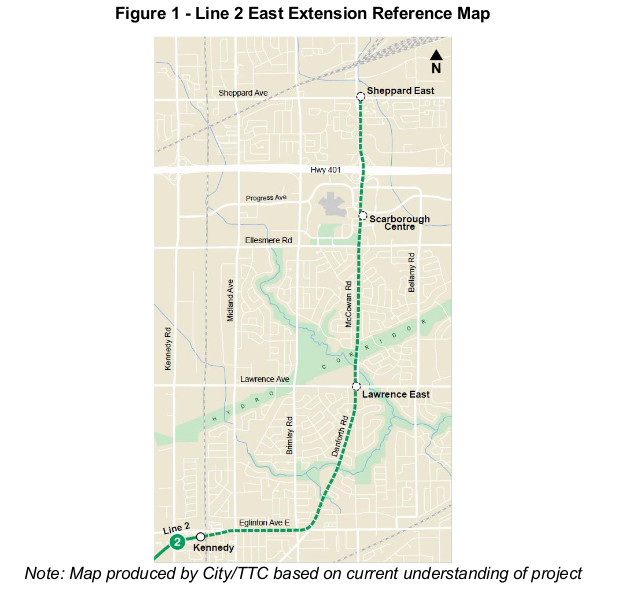 Ontario's plan for extending line 2, image City of Toronto, TTC
Ontario's plan for extending line 2, image City of Toronto, TTC
The agreement the two governments have announced outlines that:
The City is retaining ownership of the [current] subway network. Ontario has determined that it no longer needs to assume ownership of the subway system to expand Toronto’s transit network.
The TTC is retaining operations of the transit network. The TTC will continue to operate the network and maintain day-to-day operations of the four Provincial priority projects, as they come into service, including labour relations. Both governments will work to further define roles and responsibilities through operating and maintenance agreements. Under the terms of the agreement, farebox revenue will help the City defray its operating costs and the Province has committed to negotiate "ongoing and fair operating contributions from other municipalities" (meaning: York Region) for projects that extend beyond the City limits (meaning: the Line 1 extension).
The Province is funding and building transit expansion projects and supports the City putting its expansion funds towards state-of-good repair and City priority projects like the Eglinton East LRT line and Waterfront transit. The Province's proposal indicates that it would not seek capital contributions from the City for its four priority projects. The province assumes the City is redirecting its capital contributions that it originally intended to bolster to those projects toward investing in the state-of-good-repair needs of the system. The Province would also likely allow the City to redirect some of these funds to invest in other transit expansion projects with a fully developed business case, if the City has substantially upgraded rapid-transit infrastructure.
 The City approved an LRT on Eglinton West in 2017. Ontario would likely build part of the line underground, image, City of Toronto
The City approved an LRT on Eglinton West in 2017. Ontario would likely build part of the line underground, image, City of Toronto
The Province and the City agree to work together to build the four projects as quickly as possible. Various City and Ontario documents suggest the schedule for completing the Ontario Line is 2027, two years sooner than the Relief Line South in-service date. The Province has committed to ensuring the Ontario Line is operating before the Yonge north subway extension to avoid overcrowding Line 1 trains. According to CBC Toronto, a provincial official offered a more definite timeline for when Ontario would finish the other projects: 2029-2030 for extending Lines 1 and 2 and 2030-2031 for Eglinton.
The City endorses projects for Federal-government funding. The Province is asking the City to endorse re-allocating some of its funding under the federal Investing in Canada Infrastructure Program Public Transit Infrastructure Fund to the Ontario Line and the Line 2 East Extension projects. The Province and the City will continue to advance the SmartTrack stations program and Bloor-Yonge capacity improvement project through the same federal funding program.
Mayor Tory said, "The people of Toronto have voted for more transit in successive elections because they know it is desperately needed. We need it because we have a booming, growing city and region and the only way we can deal with that growth is by expanding our transit network."
The City staff report reviewing the plan echos and amplifies the mayor's remarks about why Toronto urgently needs more transit. The report states:
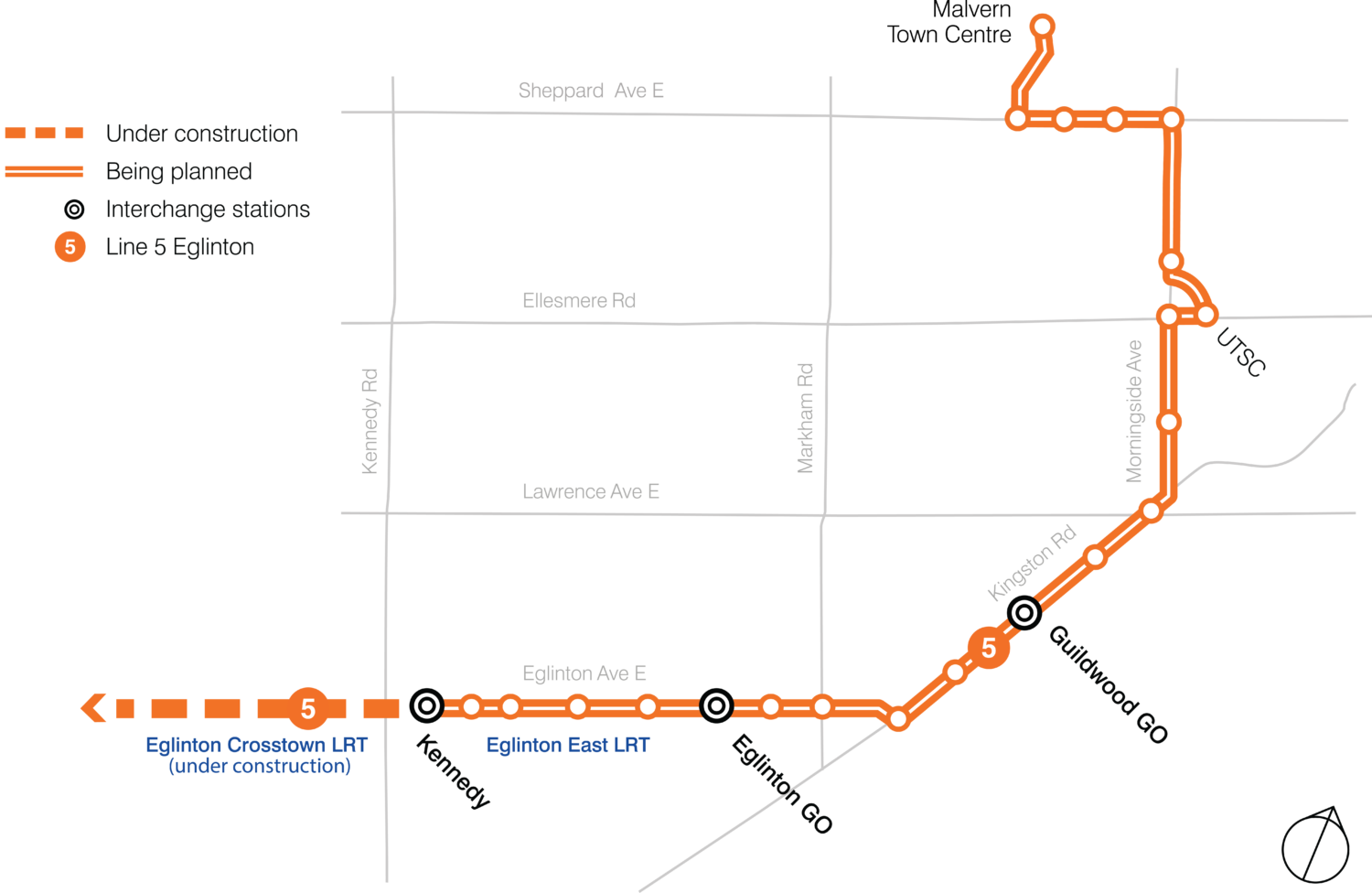 The latest City plan for an Eglinton East LRT, image, City of Toronto
The latest City plan for an Eglinton East LRT, image, City of Toronto
"Over the next twenty years, [Toronto]'s population is projected to grow by about 960,000 people. By 2041, the... population will be more than 3,900,000, exceeding the [Ontario] Growth Plan forecasts by more than 500,000. This growth will add pressure to Toronto's transit infrastructure, already in need of significant investment by all orders of government. The City and TTC have identified state of good repair and growth needs totalling at least $33.5 billion [in] the TTC capital investment plan. The Province, in announcing its investment in their four priority projects… has estimated an investment of at least $28.5 billion… This represents a more than $60 billion in transit investment, critical to maintaining the safety and reliability of the… system and growing the system to meet mobility demands of the City and region."
What are those state-of-good-repair projects? In a recent letter (PDF) to Toronto's City Manager Chris Murray, the TTC's chief executive officer Rick Leary identified some of them. Leary wrote, "The [TTC capital investment plan] outlines TTC capital needs for all asset types" (meaning: subways, streetcars and buses). Subway capital investments alone include:
- installing ATC (automatic train control) signalling on Lines 1 and 2;
- enhancing capacity on Lines 1 and 2 by buying new trains and building new yards and other subway infrastructure;
- upgrading subway tracks;
- upgrading the traction power-supply;
- upgrading subway infrastructure by maintaining communications, signal systems, bridges and tunnels – including repairing leaks and removing asbestos;
- expanding yards to accommodate the newer, larger Toronto Rocket trains;
- buying more subway cars to accommodate future growth after 2028;
- overhauling older T1 subway trains to extend their service capability;
- upgrading fire ventilation systems;
- overhauling or replacing elevators and escalators;
- improving the accessibility of older stations by adding elevators;
- improving fire safety by installing second exits from subway stations; and
- installing platform-edge doors in stations.
 The City hopes to build higher-order transit along its waterfront, image, City of Toronto
The City hopes to build higher-order transit along its waterfront, image, City of Toronto
"[Building transit is] something all the governments and all the political parties seem to agree on in principle", the mayor declared. "No political party in the current federal election would argue Toronto already has enough transit. No political party in the last provincial election ran on a mandate not to build any more transit. But actually getting on with building transit takes agreement between these governments and, going forward, it will take a relentless focus by all governments on co-operation. Building transit… takes a commitment to working together… not fighting endlessly.
Toronto's transit plans are attracting the attention of political leaders campaigning for next Monday's federal election. In the Toronto Star, writers Robert Benzie and Ben Spurr report that, unofficially, the Liberal Party of Canada is prepared to back the Ontario/City agreement and plan, if elected to form the next Government of Canada. However, the party has not yet made an official announcement. Last week another Star article by Alex Boutillier explained that the Conservative party was supporting plans for the Ontario Line and the Line 1 extension.
The Toronto Region Board of Trade, which has often advocated for greater co-operation among local and regional transit agencies, announced its approval of the deal. Jan De Silva, the board's president and CEO said, "[This] marks a significant step forward in addressing a major source of frustration for Toronto’s businesses and workforce. Moving past years of indecision over Toronto transit, [the two governments], the TTC, and Metrolinx have concluded negotiations around the Ontario Line’s transit expansion. Through Mayor Tory’s leadership and his intention to proceed on these new terms with a deal on Toronto’s top transit priority, providing transit relief for the broader City and the downtown core, Torontonians will finally get more of the transit they need."
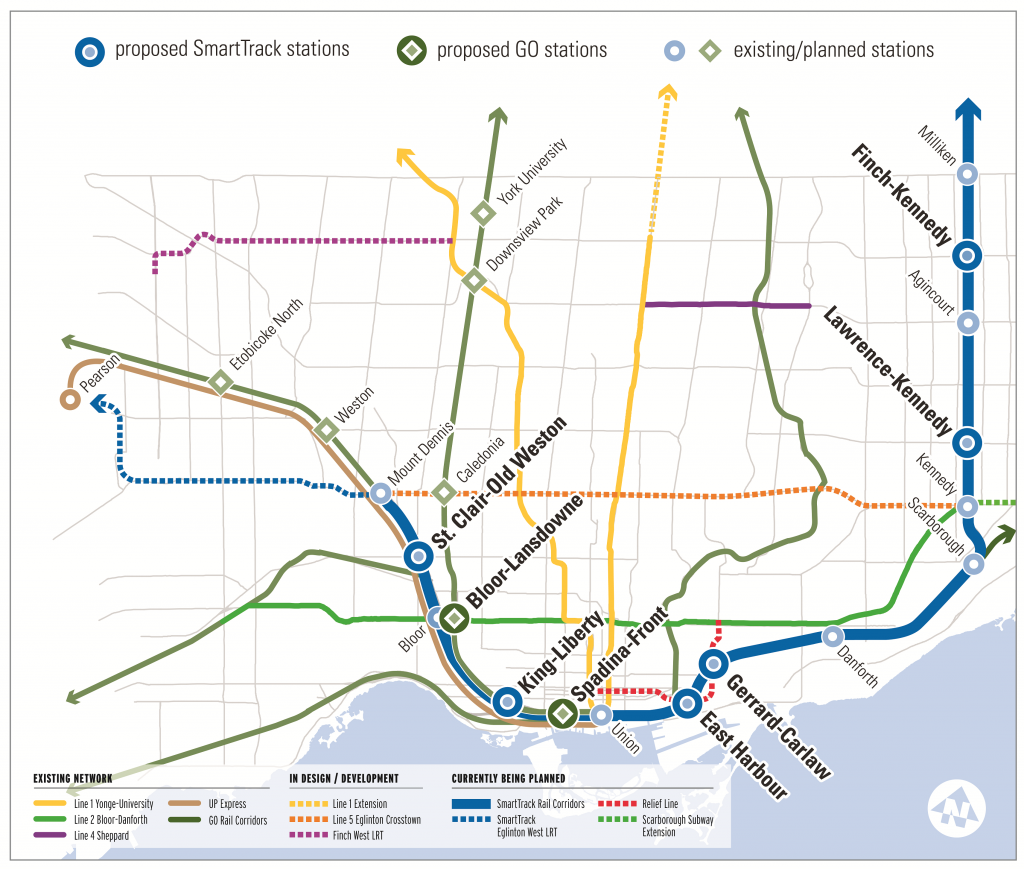 The City proposes six new GO stations in Toronto as part of SmartTrack. Metrolinx intends to build two more, image, City of Toronto
The City proposes six new GO stations in Toronto as part of SmartTrack. Metrolinx intends to build two more, image, City of Toronto
Councillor Josh Matlow, a frequent critic of the Line 2 extension project, tweeted, "The mayor’s… transit report doesn’t even compare the proposed 25 LRT network for Scarborough (RT replacement, with an additional Malvern Station, and U of T Scarborough extension) as a preferable service/cost option as opposed to a 3 stop subway. Ridiculous." The councillor continued, "On an optimistic note, I see a lot of exciting potential for the extended Ontario Line. Relief is needed on the overcrowded system. What will be needed is clarity on proposed timelines, exact light rail metro technology chosen and how stations are being chosen, ie. Ontario Place."
His council colleague, Joe Cressy, said, "In my 5 years at City Hall I’ve been through three different announcements of new transit deals. While there are certainly pros, cons, and unanswered questions... let’s take the time to study the whole proposal before signing-off on yet another new transit plan."
City and TTC staff believe the Ontario Line and the three-stop extension of Line 2 can "deliver positive benefits to Toronto's transit network, and are therefore supportable in principle." Both projects have elements that are similar to projects that Toronto Council previously considered and have the potential to bring similar positive benefits to the City, including contributing to the relief of Line 1. Both projects will also enhance the transit network by providing new higher-order transit lines throughout the city. The City and TTC have received limited information about the Eglinton West LRT and the future plans for the Yonge Subway Extension but will continue to work with the Province to better understand the benefits of those projects.
As part of the technical assessment, the City and TTC have also identified key areas that both governments need to discuss in more detail. City and TTC staff will also continue to work closely with the Province on locating portals and tracks for the Ontario Line and co-ordinating other major capital construction projects in the Lower Don River area, including relocating the Gardiner Expressway.
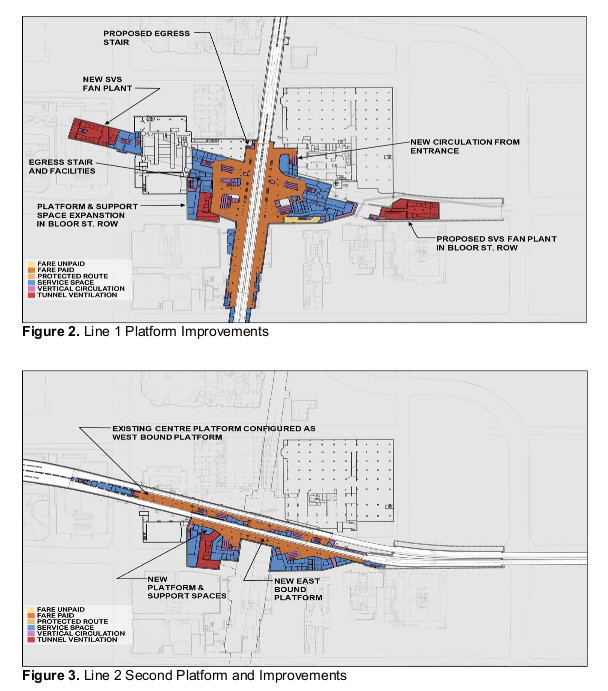 TTC plans for expanding capacity at Bloor-Yonge Station, image, TTC
TTC plans for expanding capacity at Bloor-Yonge Station, image, TTC
Another unresolved issue is whether the Province will support measures to keep the TTC's aging Line 3 Scarborough rapid transit line operating until the Line 2 extension is open. The City originally timed its one-stop express subway to Scarborough Centre to open before the Line 3 trains passed their expiry date. The provincial plan delays opening the line for as much as three more years. The City will likely press the Province to fund whatever upgrades it requires to operate the service longer, or to fund replacement bus service, if necessary.
You can read the City staff report on the agreement and its various appendixes here. The City's Executive Committee will discuss the report during its October 23 meeting. City Council will consider the staff and committee recommendations October 29 and 30.
What do you think of the plan? Add your comments in the form below, or join the discussion in our various dedicated Forum threads:
- Ontario Line;
- Line 1 extension to York Region;
- Line 2 extension to Scarborough;
- Eglinton West LRT;
- Eglinton East LRT;
- SmartTrack;
- Waterfront Transit Reset; and
- Bloor - Yonge Station capacity improvement.
* * *
UrbanToronto has a new way you can track projects through the planning process on a daily basis. Sign up for a free trial of our New Development Insider here.
| Related Companies: | Arcadis, Precise ParkLink, Urban Strategies Inc. |

 14K
14K 



